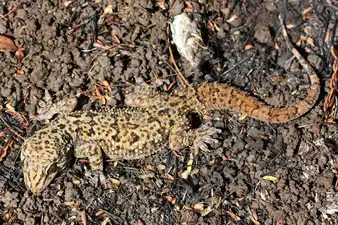Hemidactylus maculatus
Hemidactylus maculatus, also known as the spotted leaf-toed gecko or giant spotted gecko, is a species of large gecko found in the Western Ghats of India and in parts of Sri Lanka.
| Hemidactylus maculatus | |
|---|---|
 | |
| Scientific classification | |
| Domain: | Eukaryota |
| Kingdom: | Animalia |
| Phylum: | Chordata |
| Class: | Reptilia |
| Order: | Squamata |
| Family: | Gekkonidae |
| Genus: | Hemidactylus |
| Species: | H. maculatus |
| Binomial name | |
| Hemidactylus maculatus | |
| Synonyms | |
|
Hemidactylus sykesii | |
Description
Head large, oviform; snout longer than the distance between the eye and the ear-opening, 1.25 the diameter of the orbit; forehead concave; canthus rostralis swollen; ear-opening large, oval. Body and limbs moderate. Digits moderately dilated, free, inner well developed: infradigital lamellae almost perfectly straight, 9 to 11 under the inner digit, 12 or 13 under the median. Head covered anteriorly with convex granular scales, smaller in the frontal concavity, posteriorly with minute granules intermixed with round tubercles; rostral subtetragonal, not twice as broad as deep, with median cleft above; nostril pierced between the rostral, the first labial, and three or four nasals; 10 to 12 upper and 9 or 10 lower labials, mental large, triangular or pentagonal, twice as long as the adjacent labials; two pairs of chin-shields, the inner the larger, elongate, in contact behind the mental. Upper surfaces with minute, granular scales intermixed with moderate-sized trihedral, more or less strongly keeled tubercles, the largest not measuring more than one third the diameter of the eye; they are arranged very irregularly on the back, in about 20 longitudinal series. Abdominal scales smooth, roundish, imbricate. Male with a long series of femoral pores, 19 to 25 on each side, interrupted on the preanal region. Tail rounded, tapering, depressed; above with small irregular keeled scales, and 6 or 8 longitudinal series of large trihedral tubercles; beneath with a median series of transversely enlarged plates. Brown above, with darker spots, generally confluent into transverse undulating bands on the back; two more or less distinct dark streaks on each side of the head, passing through the eye; lower surfaces dirty white. From snout to vent 4.5 inches; tail 5.[2]
Distribution
Southern India and Sri Lanka. Race hunae: India (Malabar, Tirunelveli, Salem, near Madras), Sri Lanka. Type locality: restricted to Bombay by Smith 1935.
Notes
- Srinivasulu, C. & Srinivasulu, B. 2013. Hemidactylus maculatus. The IUCN Red List of Threatened Species 2013: e.T172666A1362821. https://dx.doi.org/10.2305/IUCN.UK.2013-1.RLTS.T172666A1362821.en. Downloaded on 13 June 2018.
- Boulenger, G. A. (1890) Fauna of British India. Reptilia and Batrachia.
References
- Boulenger, G.A. 1885 Catalogue of the Lizards in the British Museum (Nat. Hist.) I. Geckonidae, Eublepharidae, Uroplatidae, Pygopodidae, Agamidae. London: 450 pp.
- Deraniyagala, P. E. P. 1937 A new gecko Hemidactylus maculatus hunae. Ceylon Journal of Science, 20:185-189.
- Duméril, A.M. C. and G. Bibron. 1836 Erpetologie Générale ou Histoire Naturelle Complete des Reptiles. Vol.3. Libr. Encyclopédique Roret, Paris, 528 pp.
- Nalavade, Sanjeev B. 1997 An oversize rock gecko (Hemidactylus maculatus) from Igatpuri, Maharashtra Cobra 30: 19-20
